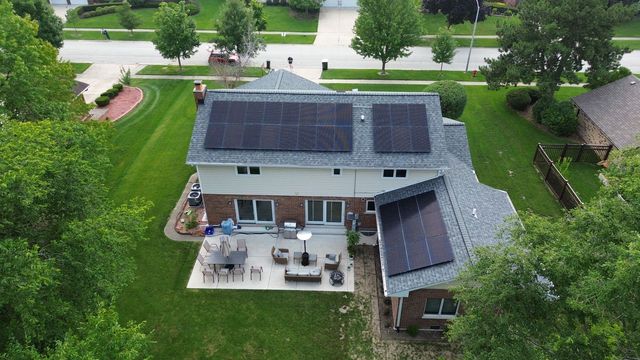No one enjoys opening the mailbox to find a stack of bills inside. Imagine being able to significantly reduce or even eliminate one of them without making a major change to your lifestyle.
It’s possible when you invest in solar panels for your home. Harnessing the power of the sun to power your appliances can potentially reduce your monthly electricity expenses to zero, but for many homeowners, investing in solar energy is cost-prohibitive. However, it doesn’t have to be.
Keep reading to learn more about the best solar system financing deals and cost-saving options, from home equity financing to tax incentives.
Article at a Glance
- Homeowners can take advantage of competitive solar system financing options to make the purchase and installation of solar panels more affordable.
- Federal tax incentives for solar panels can reduce your tax burden.
- A solar power purchase agreement (PPA) remains a good option for some homeowners.
Finding Solar Panel Financing Options
Homeowners can access various sources when they need solar system financing, from private solar loans from contractors and home equity financing to government programs that offer lower-interest-rate solar installation options and support.
Learn more about HOME SOLAR Cost & Savings
Tax Incentives and Credits
The federal government introduced the Residential Clean Energy Credit in 2022 as part of the Inflation Reduction Act. Homeowners can receive a credit of up to 30% of the cost of their solar system and installation on their federal income taxes. This can represent thousands of dollars in savings and significantly reduce your tax bill.
Some local and state governments offer additional incentives to encourage homeowners to switch to renewable energy. These may include a reduction in property taxes or access to a low-interest solar loan for qualifying applicants.
Another option is the Property Assessed Clean Energy program. PACE is available in some states and cities and offers low-cost funding that you can repay through your property taxes for up to 20 years. Not all mortgage lenders allow homeowners to participate in PACE, and it will increase your property taxes, but it’s an option to explore if other sources don’t work out.
Utilizing Home Equity for Solar Financing
If a cash purchase of solar panels isn’t practical, you can use the value of your home to access the funds that provide finance for solar panels.
You have two primary options for borrowing against your home equity: a home equity loan and a home equity line of credit.
A home equity loan allows you to take out a loan for up to a specific percentage of your equity, usually 85%. You receive the funds in a lump sum and make monthly payments on the balance. Because your home serves as collateral, you may get a lower interest rate, and the loan interest may be tax deductible.
A home equity line of credit is a revolving line of credit you can draw upon when you need cash. A HELOC is a flexible way to finance home improvements, but the interest rate can fluctuate over time. Most homeowners make interest-only payments on their HELOC until the repayment phase begins, and you must make a single balloon payment or additional monthly payments.
Additional Read: The Benefits of Solar Financing: Why You Should Consider It
Solar System Loan Options
If you don’t want to tie your solar system financing to your home, you can access solar system loans from other sources, including:
- Solar contractors
- Personal or bank loans
- Government loan programs to help pay for home improvements
Each of these options has its pros and cons. Bank loans, for example, allow you to spend the cash however you wish but may have higher interest rates. Government programs may have lower interest rates, but you must meet specific qualifications.
Solar Leasing and Power Purchase Agreements
As the price of solar panels drops, solar lease and power purchasing agreements are becoming less common, but they can still be good options for homeowners who cannot or don’t want to make a cash purchase or take out a solar loan.
With a solar lease, the solar company retains ownership of the equipment they install on your home, and you pay a monthly fee to use it. A PPA is similar, except instead of paying for the equipment and paying the local utility company, you pay for the amount of electricity the panels produce.
While these are affordable options to bring solar energy into your home, they don’t offer the tax benefits of a purchase. You won’t see as much of a financial return because the panels don’t add home value.
Connect with RxSun to Get the Best Solar Financing Deals
If you want to upgrade your home with solar energy but have concerns about the cost, call RxSun at 800-607-9786 to schedule a consultation and learn more about affordable solar system financing options. From loans to tax credits, we can show you how to maximize your investment.
 800-607-9786
800-607-9786

 1-800-60-RXSUN
1-800-60-RXSUN